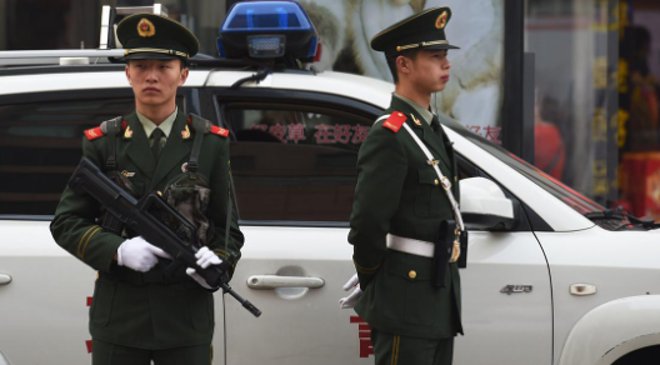European nations are doing too little to address the Chinese Communist Party’s secret police stations—which human-rights groups say are being used to monitor diaspora communities and target suspected criminals outside of local due process. This is according to a leading watchdog documenting Beijing’s foreign network.
Read More:– California Dem claims ‘economic competition’ with China leads to ‘murder of Asian Americans’
Safeguard Defenders, a Spain-based rights group, has uncovered more than 100 police contact points in over 50 countries. These are operated by public security bureaus from several coastal Chinese cities. A Newsweek investigation has verified a number of the secret facilities in the U.S., thought to operate as part of the CCP’s United Front Work Department.

Chinese officials have repeatedly dismissed reports of secret police stations. Responding to Safeguard Defenders’ report in December, Beijing’s mission in France said: “China has always firmly opposed long-arm jurisdiction, strictly abides by international law, respects the judicial sovereignty of all countries, and has not carried out any law enforcement activities through ‘overseas service stations.’
U.S. authorities are seeking to address the issue, with the Justice Department this month filing the first-known criminal charges related to secret CCP police facilities abroad.
Read More:– First direct image of black hole blasting out powerful jet is revealed
However, Laura Harth, the campaign director at Safeguard Defenders, told Newsweek that America’s European allies are lagging behind.
“The U.S. obviously had a bit of a head start, not on the police stations per se, but on investigations and prosecutions of transnational repression coming from the People’s Republic of China [PRC],” Harth said. American investigators, she added, have been able to adopt a cross-departmental approach that has so far proven elusive in Europe.
European nations, already playing catch-up, must do more to address broader CCP influence operations, Harth said, of which the secret police stations are just “the tip of the iceberg.”
‘Brazen and Sensational’
Safeguard Defenders has identified almost 50 stations spread across Europe, with a particularly large CCP footprint in Spain (nine stations), France (four), and Italy (11).
Read More:– Pressure mounts on DeSantis to fight back harder against Trump
“In Europe, the Netherlands seems to be doing very well, Germany quite well,” Harth said. “I would say the U.K.—from what I can see so far, and I do have hopes that things will change a bit in the coming weeks—is middling, not too great so far. But still better than what we’re seeing in France, Spain, Italy, southern Europe.”
“There are likely to be a few that we may not have found,” Harth said, though she added: “The stations are only one of the proxies that the PRC authorities are using to go after people abroad.
“They’re only a very, let’s say, brazen and sensational way the authorities in China have gone about it, but it’s reflective of what’s going on in general,” she added.
“This reiterates this big emphasis we’ve seen since President Xi Jinping came into power, both on internal control but also controlling the overseas communities, the importance of those overseas communities for the ‘great rejuvenation of the nation.'”
Read More:– Michigan school district faces lawsuit after forcing students to remove ‘Let’s go Brandon’ sweatshirts
The police stations have a broader brief than simply going after criminals—among them dissidents. “We find that the main task of the stations is really controlling, if you will, those larger overseas communities, those very silent communities where dissidents might be brewing, but not the people that we in the West would think of as activists,” Harth said.
Earlier this month, Chinese Foreign Ministry spokesperson Wang Wenbin hit out at the U.S. arrests of two Chinese Americans suspected of working out of a clandestine CCP facility in New York.
“China firmly opposes the U.S.’s slander and smears, its political manipulation, the false narrative of ‘transnational repression,’ and blatant prosecution of Chinese law enforcement and cyber administration officials,” Wang said.
Harth said Beijing looks unlikely to draw down its foreign operations. “They’ve been doing a host of things and they’re not showing any sign of wanting to stop. All the language they’re using suggests they will increase these kinds of operations. They will not be called ‘police stations.’ I think they’ll be that smart. But the activities will continue unabated, if not increase.”
European ‘Embarrassment’
The police stations are an arm of the United Front Work Department. This is a sprawling, de-centralized and opaque organization dedicated to advancing CCP influence in domestic industry and civil society. It also seeks to shape public opinion abroad and monitor the activities of the Chinese diaspora.
The recent U.S. charges have revived attention on the issue in Europe. French and German officials told Newsweek this month that they are investigating reports of covert Chinese police sites in their nations.
Read More:– Republican budget will harm veterans by putting at least 50,000 vets on the streets: VA
However, Harth said Europe’s response to Chinese overreach must consider the entire United Front ecosystem. “One thing we’re telling all authorities is that they should start mapping all the United Front organizations in their countries,” she explained. “Even that’s not going to cut it. That’s, again, not the whole picture. But then you will already have a better idea of how many groups may be involved in this, and these groups are all involved in influence activities, interference activities, repressive activities, and so on.”
“I can’t really say why there is reluctance, in general, to take on these kinds of issues,” Harth said of the European nations seemingly hesitant to address the issue head-on as the American authorities do. “To be honest, I find it quite staggering, especially when it comes to things such as the police stations.
“It’s true that, on the one hand, you’re dealing with transnational repression, which in and of itself would require a strong response. But we all know that governments are not necessarily moved by human rights. But the same kinds of organizations, the exact same people that are running the stations and United Front people, are involved in influence activities and other interference activities.
“The embarrassment is just going to keep growing over this, because we know these people have been cozying up to local politicians, law enforcement, academics and so on, for years, if not decades,” Harth added.
Also Read– Five questions as Biden readies for his reelection launch
“It’s about tackling transnational repression, but it’s also about protecting your institutions. It’s about educating basically your entire establishment. It’s about countering foreign interference. So, it beats me why governments are not more proactive. I really don’t get it.”

























